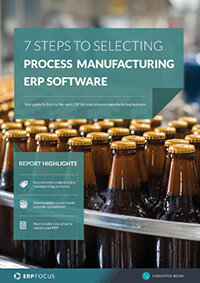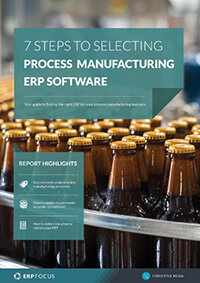Four essential features for chemical manufacturing ERPs
Chemical manufacturing is a very specialized industry. There are specializations within the category, as a producer of cleaning materials is quite different from another business that produces fibers. Many requirements are important across the board.
1. Formula management
Managing formulae is high on any list. That formula can be the ‘secret sauce’ that keeps the company in business. Chemical formulation is nonlinear, unlike a producer of discrete products. A single quantity of one ingredient might be required whether the batch is planned to yield one barrel or one shipload. The ingredients react with each other requiring the chemists to add ingredients in specific sequences and specific quantities in order to control potentially hazardous situations. The amount of certain ingredients can also change the potency of the final product. Often the final product has different price points depending on whether the active ingredients are at 10%, 50% or 90%.
2. Lot tracking
Each batch of product produced must be identified with a unique lot number. Lot tracking is common to most ERP systems but any particular chemical manufacturer will have requirements that the ERP must satisfy. That lot number then can be used to learn every data point in the production of the lot. What formulation was used? Who were the workers at every stage of production? Were the tools and production equipment cleaned properly before the lot went into production? What temperature, humidity, pressure, and other measurements were captured during production? Any of that data can be critical if a need to backtrack why a problem might have developed and been found after production. This is especially true if there has been an injury that could have been caused by problem with that lot.
Guide: seven steps to selecting process manufacturing ERP
3. Compliance to industry regulations
Chemical manufacturers must follow regulations from a wide variety of government and industrial sectors. Many products have hazards that might range from a possible skin irritation that is temporary to explosions that could flatten a building. Those agencies retain rights to enter and inspect a production plant at a moment’s notice. The agencies expect regular reports that document what was produced and in what quantities over a time range. They might also require knowledge of who the customers were that purchased products and possibly, what the customer intends to do with those products. Information required by each agency is likely to be different from other agencies. The chemical manufacturers ERP must be able to produce data for every one of those regulator reports.
4. Safety data sheets
These documents must be available to every user of the products of chemical manufacturers. Requirements vary. Some products require a new SDS with each shipment. Others might only require it is available online if a user needs to see one. Generally it the chemical manufacturer’s responsibility to ensure each customer has a current version on hand.
Your chemical manufacturing business will have other requirements. Whatever they are, your ERP will be able to help you meet those requirements.
Free white paper

7 Steps to Selecting Process Manufacturing ERP
Your guide to finding the right ERP software for your process manufacturing business

Related articles
-

Must have quality control features for process manufacturing ERPs
Critical features that your process manufacturing ERP must have for quality control processes
-

CMMC Compliance: What Aerospace and Defense Manufacturers Need to Know
Key insights on CMMC compliance, deadlines, and securing DoD contracts with CMMC 2.0 certificatio...
-

Top requirements selecting process manufacturing ERP (Guide)
What you should be looking for when selecting process manufacturing ERP

